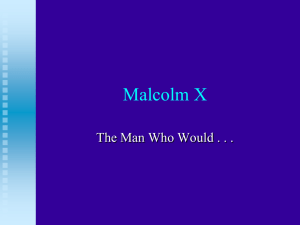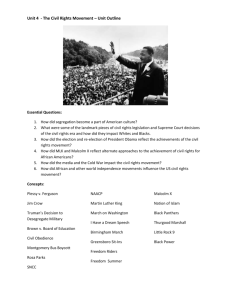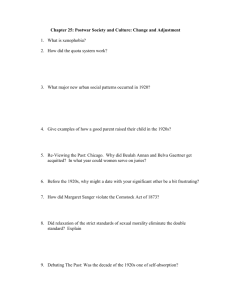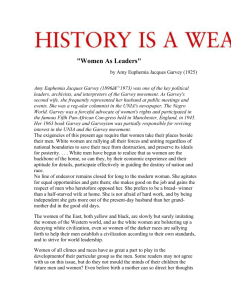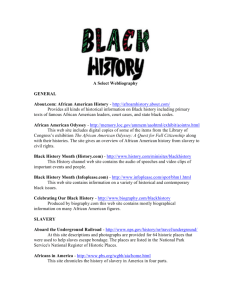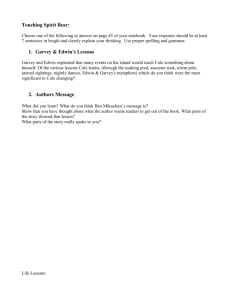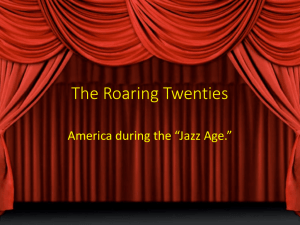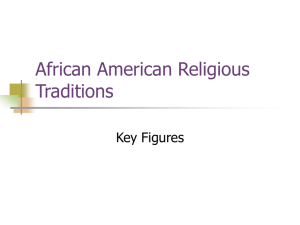Johnson Tracy Johnson Professor Schlabach HIST 236
advertisement
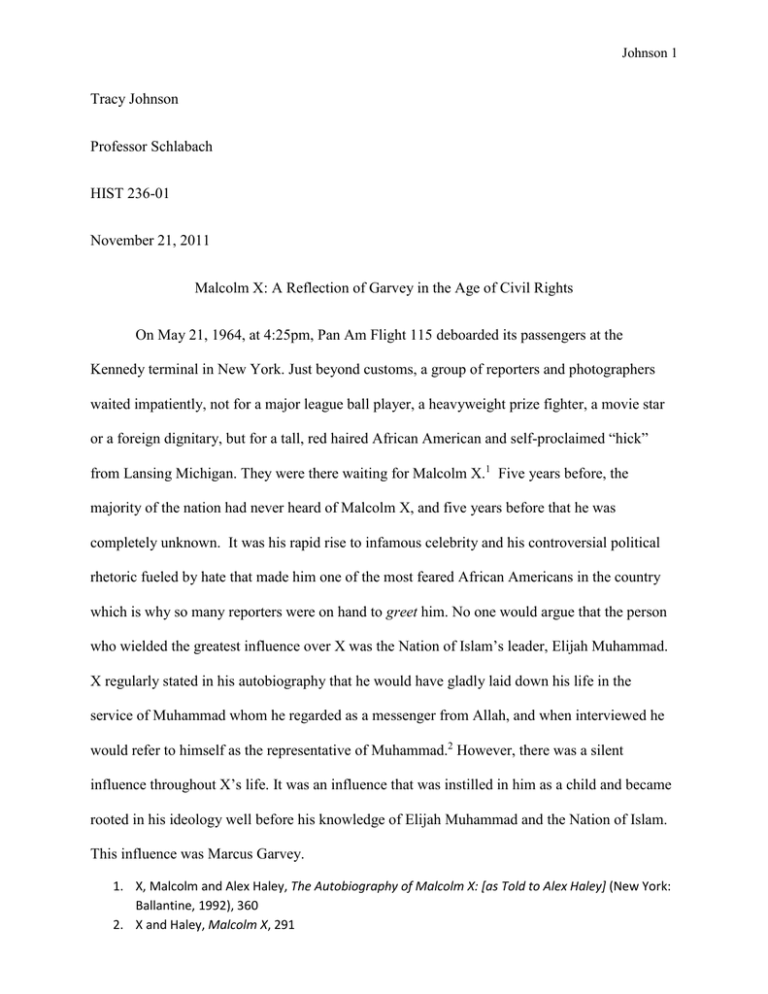
Johnson 1 Tracy Johnson Professor Schlabach HIST 236-01 November 21, 2011 Malcolm X: A Reflection of Garvey in the Age of Civil Rights On May 21, 1964, at 4:25pm, Pan Am Flight 115 deboarded its passengers at the Kennedy terminal in New York. Just beyond customs, a group of reporters and photographers waited impatiently, not for a major league ball player, a heavyweight prize fighter, a movie star or a foreign dignitary, but for a tall, red haired African American and self-proclaimed “hick” from Lansing Michigan. They were there waiting for Malcolm X.1 Five years before, the majority of the nation had never heard of Malcolm X, and five years before that he was completely unknown. It was his rapid rise to infamous celebrity and his controversial political rhetoric fueled by hate that made him one of the most feared African Americans in the country which is why so many reporters were on hand to greet him. No one would argue that the person who wielded the greatest influence over X was the Nation of Islam’s leader, Elijah Muhammad. X regularly stated in his autobiography that he would have gladly laid down his life in the service of Muhammad whom he regarded as a messenger from Allah, and when interviewed he would refer to himself as the representative of Muhammad.2 However, there was a silent influence throughout X’s life. It was an influence that was instilled in him as a child and became rooted in his ideology well before his knowledge of Elijah Muhammad and the Nation of Islam. This influence was Marcus Garvey. 1. X, Malcolm and Alex Haley, The Autobiography of Malcolm X: [as Told to Alex Haley] (New York: Ballantine, 1992), 360 2. X and Haley, Malcolm X, 291 Johnson 2 X was baptized in the teachings of Marcus Garvey at a very early age. As a young boy, X’s father, Reverend Earl Little, brought him to U.N.I.A. (Universal Negro Improvement Association) meetings where young Malcolm absorbed the Black-Nationalist rhetoric of Garvey. He listened admirably to his father preach in the homes of fellow U.N.I.A. members and took much pride in his father’s militancy.3 X said of his father “…the image of him that made me proudest was his crusading and militant campaigning with the words of Marcus Garvey.”4 The foundations of X’s Garvey based ideology was solidified when Earl Little was murdered at the hands of white supremacists. The death of X’s father became the base for his hatred toward white society in the early years of his life. As an adolescent, whether he knew it or not, X was conforming the Garvey principle of self-initiative. “Every man is his own responsibility in life. Nature never made anyone dually, but singly, therefore you have your single responsibility.”5 It was in the ghettos of Harlem where X lived by this philosophy. No one, especially white society, was going to help a young Negro survive on the streets of Harlem. The only way to survive was to help yourself by preying on the weak, ignorant and old. “As in the case of any jungle, the hustler’s every waking hour is lived with the practical and the subconscious knowledge that if he ever relaxes, if he ever slows down, the other hungry restless foxes, ferrets, wolves, and vultures out there with him won’t hesitate to make him their prey.”6 Lying, cheating, stealing and hustling were the only ways to survive. This lesson of self-initiative was taught to X, not in a class room or by a wise mentor, but by the cruel, unforgiving streets of the African American ghetto. Later, X would preach of this same “self-initiative” for the Negro race. “The American black man should be focusing his every 3. X and Haley, Malcolm X, 6 4. Ibid. 5. Garvey, Marcus and Tony Martin, Message to the People: The Course of African Philosophy (Dover, MA: Majority, 1986), 311 6. X and Haley, Malcolm X, 109 Johnson 3 effort toward building his own businesses, and decent homes for himself… The black man in the ghettos, for instance, has to start self-correcting his own material, moral and spiritual defects and evils… the black man has to lift up his own sense of values.”7 Self-initiative, a principle strongly supported and taught by Garvey, became one of the main pillars to which X used to up-lift the African American race. It was inevitable that through X’s life of crime and drugs that he would eventually find himself in jail. In February 1946, X was tried for burglary and sentenced to eight to ten years in prison. After a few shaky years in prison, X converted to Islam and devoted all his time to learning as much as he could. “You will never catch me with a free fifteen minutes in which I am not studying something…”8 Once again, Garvey’s hidden influence compelled X’s desire to learn. This was essential to Garvey’s teachings. In his book, Message to the People: The Course of African American Philosophy, he writes “You must never stop learning… The world’s greatest men and women were people who educated themselves outside the university… You [all] have the same opportunity the university student [has]--- read and study.”9 Never did anyone take this lesson as literally as Malcolm X. While in prison, X buried himself in books, expanding his knowledge and honing his skills as a reader, writer, and speaker. He even went as far as copying the entire dictionary to learn every word it contained. “…an English writer telephoned me from London asking questions. One was, ‘What’s your alma mater?’ I told him ‘Books.’”10 X’s ambition to learn did not end when he was released from prison. Throughout his life and even up to his final few months, certain he would meet a violent end at any minute, he professed his desire to never stop learning. “I would just like to study. I mean ranging study, because I have a wide-open mind. I am interested in almost any subject you can mention.”11 7. 8. 9. 10. X and Haley, Malcolm X, 275-276 Ibid., 179 Garvey and Martin, Message, 1 X and Haley, Malcolm X, 179 Johnson 4 X believed that through self-education and the desire to learn more, one could form the objective and open mind needed to understand and combat the race issues of America. One of the many valuable skills X learned while in prison was the ability to speak well. Garvey’s influence can be seen once again in X’s desire to learn to communicate his ideologies in the most effective way possible. “Elocution means to speak out. That is to say if you have a tale to tell, tell it and tell it well.”12 Garvey believed that being able to communicate effectively was an essential weapon in the arsenal of racial up lift. Without it, one could not communicate his desires, wants, needs, or demands and expect any kind of positive outcome. Once X had accumulated enough knowledge from his studies, he then felt compelled to speak out about what he had learned, especially if it concerned white oppression. He found his outlet through the prison’s weekly debates. “Standing up there, the faces looking up at me, the things in my head coming out of my mouth, while my brain searched for the next best thing to follow what I was saying, and if I could sway them to my side by handling it right, then I had won the debate… I’d put myself in my opponents place and decide how I would try to win if I had the other side; and then I’d figure a way to knock down those points.”13 The skills X learned from these debate sessions would undoubtedly help him later when faced with bloodthirsty reporters and interviewers ready to devour him alive. Perhaps Garvey’s most obvious influence on X was the ideology embedded in the Black Nationalist movement. In the early 20th century, Garvey spearheaded a movement in which he called for all African Americans to return to Africa. According to Garvey, the racial up-lift of the Negro race was impossible in the United States. He believed integration could never be achieved in a society controlled by white oppressors. “If you cannot live alongside the white man in peace, 11. X and Haley, Malcolm X, 380 12. Garvey and Martin, Message, 38 13. X and Haley, Malcolm X, 184 Johnson 5 if you cannot get the same chance and opportunity alongside the white man, even though you are his fellow citizen… then find a country of your own and rise to the highest position in that country.”14 What had made Garvey the most feared black man by whites in the United States would also make X the most feared decades later. X believed it was time for the black race to strike out on its own and to abandon the idea of integration. “Why Black Nationalism? Well, in the competitive American society, how can there ever be any white-black solidarity before there is first some black solidarity?”15 The formation of an all-black Nationalist organization was his solution for racial up-lift. “…I wanted---an all-black organization whose ultimate objective was to help create a society in which there could exist honest white-black brotherhood.”16 X also expressed his Black Nationalism, specifically concerning a separate state philosophy, during a television interview on Chicago’s City Desk where he states “If America cannot bring about freedom, justice, and equality for our people in this country, then America should allow us to leave. [If this cannot be done] America should separate part of the country and give us a section where we can live.”17 Malcolm’s words in this quote are an almost mirror image of Garvey’s “Back to Africa” campaign. X also brought up the point in his autobiography that another race of oppressed people, the Jews, had land set aside for them with the formation of Israel. “…their own country---the one thing that every race of man in the world respects, and understands.”18 X uses this as a Historical example of how total separation has worked in the past. As X made his way off the plane at the Kennedy terminal, he noticed the mob of reporters waiting to sink their teeth into a juicy story. “When I saw the crowd of fifty or sixty 14. Garvey, Marcus, Deborah Forczek, and Carol A. Rudisell, Marcus Garvey and Universal Negro Improvement Association Papers / Robert A. Hill, Editor, Carol A. Rudisell, Assistant Editor (Berkeley: University of California, 1983) 414 15. X and Haley, Malcolm X, 374 16. Ibid., 375 17. Malcolm X, City Desk. (Chicago, 1963) 18. X and Haley, Malcolm X, 278 Johnson 6 reporters and photographers, I honestly wondered what celebrity I had been on the plane with. But I was the ‘villain’ they had come to meet.”19 With the help of the Nation of Islam and the hidden influence of Garvey, instilled in him as a child, X’s infamy had grown beyond what Garvey’s had been several decades before. Malcolm X’s religious beliefs and ideologies can certainly be credited to the influence of Elijah Muhammad and the Nation of Islam, but his militancy against African American discrimination and degradation can be attributed to the influence of Marcus Garvey. Malcolm X was a true reflection of Garvey in the age of Civil Rights. 19. X and Haley, Malcolm X, 360 Johnson 7 Bibliography Garvey, Marcus, Deborah Forczek, and Carol A. Rudisell, Marcus Garvey and Universal Negro Improvement Association Papers / Robert A. Hill, Editor, Carol A. Rudisell, Assistant Editor. Berkeley: University of California, 1983 Garvey, Marcus and Tony Martin, Message to the People: The Course of African Philosophy. Dover, MA: Majority, 1986. X, Malcolm and Alex Haley, The Autobiography of Malcolm X: [as Told to Alex Haley]. New York: Ballantine, 1992. X, Malcolm, “City Desk Interview, Chicago, 1963” Google Videos. http://video.google.com/videoplay?docid=-2736233772753336254#. Last accessed 11/22/2011
